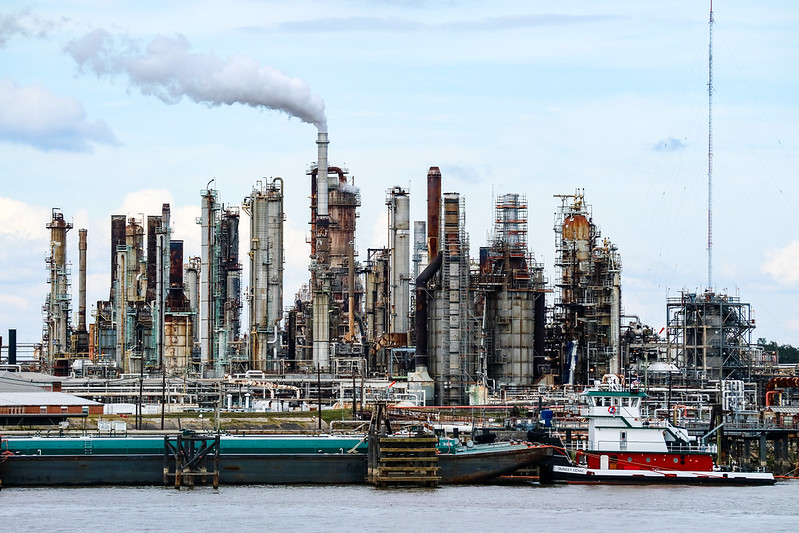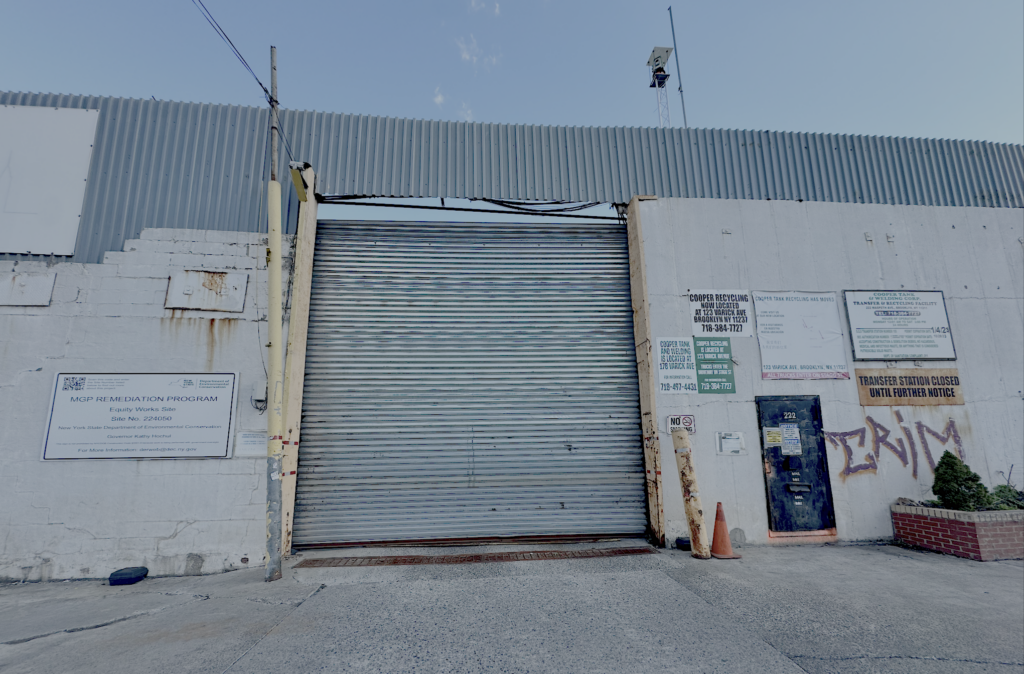September saw a flurry of new lawsuits filed by cities and states against major fossil fuel companies over the climate crisis and the resulting impacts that are already being felt. After Hoboken, New Jersey sued Big Oil and its largest trade association, the American Petroleum Institute, on September 2, back-to-back lawsuits came the following week from Charleston, South Carolina and the state of Delaware. Connecticut then followed with a lawsuit singularly targeting ExxonMobil, which remains one of the largest oil companies in the world and appears determined to double down on its core fossil fuel business despite knowing decades ago about the climate consequences of using its products.
These climate lawsuits seek to hold companies like Exxon accountable for spending decades misleading the public on climate risks. Those dangers, projected long ago, have literally hit home in recent months with scorching heat, “record breaking” storms battering the Gulf Coast, and unprecedented and devastating wildfires burning millions of acres in the western U.S.
“Long before Trump entered office, oil and gas CEOs predicted this would be the result of their unfettered industry,” Greenpeace USA Climate Campaign Director Janet Redman said in a late August press release responding to the landfall of Hurricane Laura. “Climate denial is not a victimless crime, and it’s time for the fossil fuel industry to be held accountable.”
The current wave of climate accountability lawsuits started three years ago with a handful of coastal California communities, and has since burgeoned to include nearly two dozen communities across the country so far that are taking the fossil fuel industry to court. Six attorneys general are currently suing Exxon for alleged climate deception, litigation that has started to garner comparisons to the state lawsuits targeting Big Tobacco firms for lying about the health risks of smoking.
Read more in the DeSmog series: Tracking the Lawsuits Fighting for Climate Accountability
The climate cases have not yet made it to trial, with the exception of a securities fraud lawsuit brought by the New York Attorney General against Exxon. A judge dismissed that case following a trial held last October, finding that Exxon did not deceive its investors over climate risks to its business. Since then, attorneys general have filed several new cases alleging that major oil companies such as Exxon misled consumers in violation of state consumer protection laws.
“These companies were not simply reckless in the pursuit of profits,” District of Columbia Attorney General Karl Racine, who sued BP, Chevron, Exxon, and Shell in June, explained during a recent online briefing. “Their deceptive advertisements and misleading claims violated the D.C. Consumer Protection law.”
One legal expert who is following these climate cases told DeSmog that these consumer protection cases may have an easier path towards trial in state courts. “These are straight-up state consumer rights laws,” Pat Parenteau, an environmental law professor at Vermont Law School (and this writer’s former law professor) said. “So those [cases] are going to go straight to trial I think.”
Supreme Court Steps in to Examine Procedural Question
Many of the other climate lawsuits targeting fossil fuel companies have been tied up in a procedural battle over whether the cases belong in state or federal courts. The companies want them in federal courts, where they may be more likely to be dismissed. But four federal district judges and three federal appeals courts have decided the cases should be sent back to state courts. The companies are challenging these decisions and have even asked the Supreme Court to intervene in a case brought by Baltimore.
Last week on October 2, the Supreme Court granted the fossil fuel companies’ request. The Court will not be weighing in directly on the federal versus state court issue, but rather will be considering a more technical question of federal civil procedure, specifically the extent of appeals courts’ review of orders sending cases back to state courts, called remand orders.
On Friday, the Supreme Court agreed to hear BP v. Baltimore, a very important climate liability case. But the issue before the justices is way more complicated than that. We broke it down: https://t.co/1fHZeSjt9H
— Ellen M. Gilmer (@ellengilmer) October 5, 2020
Should the Supreme Court side with the fossil fuel companies on this narrow procedural question, Baltimore’s case and likely several other climate liability suits would go back to the appeals courts to then consider the companies’ other arguments (or grounds for removal) for why the cases belong in federal courts. Three appeals courts that have reviewed remand orders in climate cases so far — the Fourth Circuit, the Ninth Circuit, and the Tenth Circuit — have all concluded they can only consider the companies’ claim that they acted under the direction of “federal officers” in their fossil fuel extraction operations, and all three courts have rejected this argument.
Parenteau said he thinks the companies’ additional arguments are weak and that the cases should eventually return to state courts. “The defendants can run but they can’t hide,” he said.
Other legal experts and supporters of climate litigation said the procedural wrangling is a delay tactic the fossil fuel companies are using to try to avoid facing potential accountability in court.
“Fossil fuel executives will do anything to avoid having to explain to a jury in state court how they knew and then lied about climate change. That is why they’ve fought to delay these cases and push them to federal court,” Richard Wiles, executive director of the Center for Climate Integrity, an initiative advocating for climate accountability, said in a recent statement.
“This is unquestionably a delay tactic, and I believe the industry defendants will do everything they can to prevent these cases from getting to discovery, much less the merits of the plaintiffs’ claims,” Karen Sokol, a law professor at Loyola University, told DeSmog via email.
The Supreme Court’s intervention in Baltimore’s case, she said, could have the effect of deterring or at least delaying other communities from filing new climate lawsuits against oil companies. As for climate cases already filed, she said the Supreme Court’s involvement at this early stage would further stall proceedings.
“In the near term the impact is a further delaying of their day in court,” she said.
Status of Other Climate Cases
Besides the Baltimore case, there are over a dozen other climate accountability lawsuits against oil and gas companies currently pending in state and federal courts.
A set of cases filed by San Mateo County and five other California communities is on hold due to the fossil fuel companies’ expected move to petition the Supreme Court like they are doing in the Baltimore case. The companies were also expected to petition the Supreme Court in lawsuits brought by Oakland and San Francisco, and this has put a case brought by Washington’s King County (home to Seattle) further on hold. A lawsuit filed by a West Coast commercial fishermen’s association has also been paused. Honolulu’s lawsuit, filed in March this year, had been temporarily paused but is now proceeding to the battle over state versus federal court jurisdiction.
Cases brought by New York City and Rhode Island are awaiting rulings from the Second and First Circuit appeals courts, respectively. New York’s lawsuit was initially dismissed in federal court and the City is appealing. Rhode Island’s case had been cleared to advance in state court, which the fossil fuel companies are challenging. The case is currently on hold in state court pending Supreme Court rulings in unrelated litigation involving auto manufacturers.
Several Colorado communities suing ExxonMobil and Suncor are awaiting a decision from a Colorado state court on the companies’ request to toss the case. A lawsuit brought by the Massachusetts attorney general against Exxon alleging the company deceived investors and consumers on climate risks is also currently in state court, with Exxon trying to get it dismissed.
One climate lawsuit brought by an environmental group called Conservation Law Foundation against Shell in Rhode Island recently overcame the company’s bid to dismiss in state court, meaning it could be one of the first cases to make it to discovery and trial. That case seeks to hold Shell accountable for climate risks to its own oil storage facility located along the Providence River.
Breaking: Judge rejects Shell Oil’s motion to dismiss CLF lawsuit.
This marks the FIRST time a private fossil fuel entity will have to answer for its knowledge of climate change and the relative dangers.https://t.co/lkl2XWD0Lj— Conservation Law Foundation (@CLF) September 28, 2020
The half dozen cases filed most recently against major oil companies — including back-to-back suits filed in June by Minnesota and Washington, D.C., as well as cases brought last month by Hoboken, Charleston, Delaware, and Connecticut — are in early procedural battles, with the fossil fuel industry trying or expected to punt the cases to federal courts.
A Long Fight Ahead
The legal fight against fossil fuel firms over climate is a long road that will take years to play out. As Ann Carlson, an environmental law professor at UCLA School of Law, said during a July webinar, these cases are “going to be fought tooth and nail.”
Just as fossil fuel companies staved off policy responses to rein in carbon emissions from their products, they are now fighting to avoid the revelation of internal documents — which could happen during the pre-trial process known as discovery — showing the extent of their alleged conspiracy to undermine climate science and distort the public narrative around the risks of burning coal, oil, and gas.
Internal industry documents that have already been made public outside of the courts have uncovered evidence that oil companies including ExxonMobil and their lobbying groups were aware of climate risks, chose to downplay them, and sowed uncertainty about climate science in public but not in private.
“If the cases get to discovery, there will undoubtedly be further revelations about the extent of the companies’ knowledge about the climate harms that the use of their products was causing and their disinformation campaigns in response,” Sokol said. “Although in its PR messaging the industry insists that these cases are without merit, the industry’s litigation strategy has been to do everything it can to prevent these cases from ever being heard on the merits.”
Read more in the DeSmog series: Tracking the Lawsuits Fighting for Climate Accountability
Main image: An ExxonMobil facility on the banks of the Mississippi River, October 26, 2016. Credit: Terekhova, CC BY–NC–ND 2.0
Subscribe to our newsletter
Stay up to date with DeSmog news and alerts







